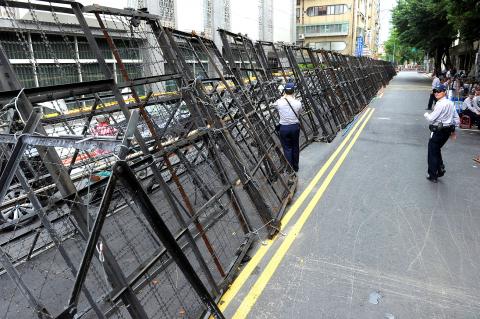A Ministry of the Interior proposal to use pre-emptive detention against protesters who have repeatedly broken the law during demonstrations yesterday came under fire from human rights advocates, who said that it could be a step toward restricting freedom of expression.
“The idea is ridiculous, because in a democracy it’s just normal for people to be out on the streets to voice their opinion,” said Frida Tsai (蔡培慧), spokeswoman for the Taiwan Rural Front, which has organized numerous street protests.
“Pre-emptive detention is designed for people who have actually committed a crime, not for people who are on the street to voice their opinion,” Tsai said.

Photo: CNA
She said that some protesters may have broken the law during demonstrations, but the police cannot assume that they will do the same in future demonstrations and detain them beforehand.
“I would like to remind the police that we are a democracy, and, as representatives of the state power on the first line, officers should always remember that their job is to serve the people,” she added.
Tsai was responding to a proposal made earlier this week by Deputy Minister of the Interior Jonathan Chen (陳純敬), who said that he would ask the police to keep an eye on “extremists” who have repeatedly engaged in unlawful conduct during demonstrations and to forward relevant information to prosecutors, making them potential targets for pre-emptive detention.
Calling the idea “absurd,” Taiwan Association for Human Rights president and lawyer Chiu Hsien-chih (邱顯智) accused the government of trying to suppress freedom of speech by threatening the public.
“Pre-emptive detention is commonly used against repeat offenders — and the Code of Criminal Procedure (刑事訴訟法) stipulates that the measure can only be used against offenders of specific crimes — to prevent them from repeating the crime. It is rarely used against protesters by governments around the world,” Chiu said.
“Moreover, I think it would be difficult for prosecutors to convince the judge to allow pre-emptive detention,” Chiu said.
Thomas Chan (詹順貴), a lawyer and long-time human rights and environmental activist, agreed, saying that he did not think pre-emptive detention could be used on protesters, since there is a set of strict regulations on how a person may be pre-emptively detained.

Intelligence agents have recorded 510,000 instances of “controversial information” being spread online by the Chinese Communist Party (CCP) so far this year, the National Security Bureau (NSB) said in a report yesterday, as it warned of artificial intelligence (AI) being employed to generate destabilizing misinformation. The bureau submitted a written report to the Legislative Yuan in preparation for National Security Bureau Director-General Tsai Ming-yen’s (蔡明彥) appearance before the Foreign Affairs and National Defense Committee today. The CCP has been using cognitive warfare to divide Taiwanese society by commenting on controversial issues such as Taiwan Semiconductor Manufacturing Co’s (TSMC, 台積電) investments in the

INVESTIGATION: The case is the latest instance of a DPP figure being implicated in an espionage network accused of allegedly leaking information to Chinese intelligence Democratic Progressive Party (DPP) member Ho Jen-chieh (何仁傑) was detained and held incommunicado yesterday on suspicion of spying for China during his tenure as assistant to then-minister of foreign affairs Joseph Wu (吳釗燮). The Taipei District Prosecutors’ Office said Ho was implicated during its investigation into alleged spying activities by former Presidential Office consultant Wu Shang-yu (吳尚雨). Prosecutors said there is reason to believe Ho breached the National Security Act (國家安全法) by leaking classified Ministry of Foreign Affairs information to Chinese intelligence. Following interrogation, prosecutors petitioned the Taipei District Court to detain Ho, citing concerns over potential collusion or tampering of evidence. The

‘COMPREHENSIVE PLAN’: Lin Chia-lung said that the government was ready to talk about a variety of issues, including investment in and purchases from the US The National Stabilization Fund (NSF) yesterday announced that it would step in to staunch stock market losses for the ninth time in the nation’s history. An NSF board meeting, originally scheduled for Monday next week, was moved to yesterday after stocks plummeted in the wake of US President Donald Trump’s announcement of 32 percent tariffs on Taiwan on Wednesday last week. Board members voted to support the stock market with the NT$500 billion (US$15.15 billion) fund, with injections of funds to begin as soon as today. The NSF in 2000 injected NT$120 billion to stabilize stocks, the most ever. The lowest amount it

NEGOTIATIONS: Taiwan has good relations with Washington and the outlook for the negotiations looks promising, Minister of Economic Affairs J.W. Kuo said Taiwan’s GDP growth this year is expected to decrease by 0.43 to 1.61 percentage points due to the effects of US tariffs, National Development Council (NDC) Minister Paul Liu (劉鏡清) said at a meeting of the legislature’s Economics Committee in Taipei yesterday, citing a preliminary estimate by a private research institution. Taiwan’s economy would be significantly affected by the 32 percent “reciprocal” tariffs slapped by the US, which took effect yesterday, Liu said, adding that GDP growth could fall below 3 percent and potentially even dip below 2 percent to 1.53 percent this year. The council has commissioned another institution